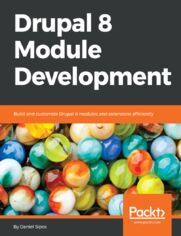Drupal 8 Module Development - Helion

Tytuł oryginału: Drupal 8 Module Development
ISBN: 978-17-821-6878-2
Format: ebook
Data wydania: 2017-10-27
Ksi─Ögarnia: Helion
Cena ksi─ů┼╝ki: 169,00 z┼é
Learn to create and customize impressive Drupal 8 modules to extend your website's functionalities
About This Book
- Unleash the power of Drupal 8 programming by creating efficient modules and extensions
- Explore a plethora of Drupal 8 APIs and get the best out of them using the power of PHP coding
- Learn to implement efficient data management and data security by creating dedicated modules for it.
Who This Book Is For
The primary target of this book is Drupal developers who want to learn how to write modules and carry out development in Drupal 8. It is also intended for Drupal site builders and PHP developers who have basic Object Oriented Programming skills.
A little bit of Symfony experience is helpful but not mandatory.
What You Will Learn
- Write a Drupal 8 module with custom functionality and hook into various extension points
- Master numerous Drupal 8 sub-systems and APIs
- Model, store, and manipulate data in various ways and for various purposes
- Display data and content in a presentable and secure way
- Learn about the theme system and render arrays
In Detail
Drupal is an open source web-based content management system (CMS) that can be used for building anything from simple websites to complex applications. It enables individuals and organizations to build platforms that engage users and deliver the right content at the right time.
Drupal 8 is an exciting new development in the Drupal community. However, the differences from the previous version are substantial and this can put quite some pressure on Drupal 7 developers that need to catch up. This book aims to help such developers in getting up to speed with Drupal 8 module development.
The book first introduces you to the Drupal 8 architecture and its subsystems before diving into creating your first module with basic functionality. Building upon that, you will cover many core APIs and functionalities available to module developers.
You will work with the Drupal logging and mailing systems, learn how to output data using the theme layer and work with menus and links programmatically. Then, you will learn how to work with different kinds of data storages, create custom entities, field types and leverage the Database API for lower level database queries. Moreover, you will learn about the Drupal 8 access system and caching layer as well as the APIs used for data processing (queues and batches).
You will further see how to introduce javascript into your module, work with the various file systems and ensure the code you write works on multilingual sites. Finally, you will learn how to programmatically work with Views, write automated tests for your functionality and also write secure code in general.
By the end of the book, you will have learned how to develop your own custom module from scratch that can help solve a small problem or even provide complex functionality. And who knows, maybe you'll even contribute it back to the Drupal community.
Style and approach
This book aims to introduce PHP developers to programming concepts specific to Drupal 8 to get them started on writing their own functionality with Drupal 8 and create efficient Drupal 8 modules and extensions.
Osoby które kupowały "Drupal 8 Module Development", wybierały także:
- Learning PHP, MySQL, JavaScript, CSS & HTML5. A Step-by-Step Guide to Creating Dynamic Websites. 3rd Edition 157,37 zł, (29,90 zł -81%)
- Web Database Applications with PHP and MySQL. 2nd Edition 157,37 zł, (29,90 zł -81%)
- PHP 8 Programming Tips, Tricks and Best Practices 142,38 zł, (29,90 zł -79%)
- Domain-Driven Design in PHP 135,91 zł, (29,90 zł -78%)
- PHP Microservices 135,91 zł, (29,90 zł -78%)
Spis tre┼Ťci
Drupal 8 Module Development. Build and customize Drupal 8 modules and extensions efficiently eBook -- spis tre┼Ťci
- 1. Developing for Drupal 8
- 2. Creating Your First Module
- 3. Logging and Mailing
- 4. Theming
- 5. Menus and Menu Links
- 6. Data Modeling and Storage
- 7. Your Own Custom Entities
- 8. Database API
- 9. Your Own Custom Fields
- 10. Access Control
- 11. Caching
- 12. JavaScript in Drupal
- 13. Multilingual
- 14. Queues and Batches
- 15. Views
- 16. Working with Files and Images
- 17. Automated Tests
- 18. Appendix: Security





